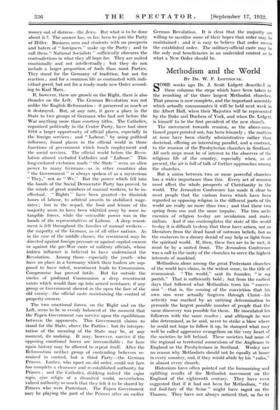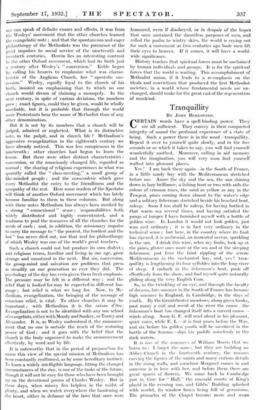Methodism and the World
BY DR. W. F. LOFTROUSE.
SOME weeks ago Dr. J. Scott Lidgett describel in these columns the steps which have been taken to the reuniting of the three largest Methodist churches.
That process is now complete, and the important assembly which actually consummates it will be held next week in the Albert Hall, when their Majesties will be represented by the Duke and Duchess of York, and when Dr. Lidgett is himself to be the first president of the new church.
The movement towards reunion, as the above-men- tioned paper pointed out, has been leisurely ; the matters at issue have been chiefly administrative rather than doctrinal, offering an interesting parallel, and a contrast, to the reunion of the Presbyterian churches in Scotland.
All such steps must be of interest to the observer of the religiouS life of the country, especially when, as at present, the air is full' of talk of further approaches among the churches.
But a union between two or more powerful churches has a wider importance than this. Every act of reunion must affect the whole prospects of Christianity in the world. The Jerusalem Conference has made it clear to most people that the various forces which have been regarded as opposing religion in the different parts of the world are really no more than two ; and that these two spring from one and the same impulse. The two arch- enemies of religion to-day are secularism and mate- rialism. And if one contemplates the state of the world to-day it is difficult to deny that these have arisen, not as liberators from the dead hand -of outworn beliefs, but as the enslavers to a dreary denial of any help or light from the spiritual world. If, then, these foes are to be met, it must be by a united front. The Jerusalem Conference was a call to the unity of the churches to serve the highest interests of mankind.
Methodism alone among the great Protestant churches of the world lays claim, in the widest sense, to the title of ecumenical. " The world," said its founder, " is my parish." That is sufficiently bold ; but from the earliest days that followed what Methodists term his " conver- sion "—that is, the coming of the conviction that his own sins were actually forgiven through Christ—his activity was marked by an untiring determination to persuade the largest possible number of people that the same discovery was possible for them. He inoculated his followers with the same resolve ; and although he was also determined, as he said, never to strike a blow where he could not hope to follow it up, he stamped what may well be called aggressive evangelism on the very heart of the societies he left behind. These societies had none of the regional or territorial connexions of the Anglicans in England or the Presbyterians in Scotland. Wesley saw no reason why Methodists should not be equally at home in every country, and, if they would abide by his "rules," in almost every church.
Historians have often pointed out the humanizing and uplifting results of the Methodist movement on the England of the eighteenth century. They have even suggested that if it had not been for Methodism, " the red fool-fury of the Seine " might have raged on the Thames. They have not always noticed that, so far as one can speak of definite causes and effects, it was from the Wesleys' movement that the other churches learned the evangelistic note ; and that the spontaneous and eager philanthropy of the Methodists was the precursor of the great impulses to social service • of the nineteenth and twentieth centuries. Herein lies an interesting contrast to the other Oxford movement, which had its birth just a century after Wesley's " conversion." Keble began by calling his hearers to emphasize what was charac- teristic of the Anglican Church, her " apostolic suc- cession." Wesley, equally loyal to the church of his birth, insisted on emphasizing that to which no one church would dream of claiming a monopoly. In the next century, in spite of various divisions, the numbers grew ; exactfigures, could they be given, would be wholly unreliable, but it is probable that through the world more Protestants bear the name of Methodist than of any other denomination.
But it is not by its numbers that a church will be judged, admired or neglected. What is its distinctive note, in the pulpit, and in church life ? Methodism's aggressive evangelization in the eighteenth century we have already noticed. This was less conspicuous in the nineteenth ; other churches had begun to learn the lesson. But there were other distinct characteristics : conversion, or the consciously changed life, regarded as normal ; the sharing of religious experiences in what was quaintly called the " class-meeting," a small group of like-minded people ; and the camaraderie which gave every Methodist the entry to the friendliness and the sympathy of the rest. Here some readers of the Spectator will think of another Oxford movement which has lately become familiar to them in these columns. But along with these notes Methodism has always been marked by a strong " connexional " sense ; responsibilities both widely distributed and highly concentrated, and a readiness to pool the resources of all the churches for the needs of each ; and, in addition, the missionary impulse to carry the message to " the poorest, the lowliest and the lost" has never died out, nor that zeal for philanthropy of which Wesley was one of the world's great teachers.
Such a church could not but produce its own dialect ; and religious terms, familiar and living in one age, grow strange and unnatural in the next. But sin, conversion, the group-mind and salvation are problems that press as steadily on our generation as ever they did. The psychology of the day has even given them fresh emphasis. The pressure may be felt in a different way ; and the relief that is looked for may be expected in different lan- guage ; but relief is what we long for. Now, to Me- thodism, evangelization, the bringing of the message of conscious relief, is vital. To other churches it may be important ; with Methodism it is the raison (rare. Evangelization is not to be identified with any one school of evangelists,. either with Moody and Sankey, or Torrey and Alexander. It is, as Wesley understood it, the announce- ment that no one is outside the reach of the restoring power of God ; and it goes with the belief that the church is the body organized to make the announcement effectively, by word and by life.
It is noteworthy that in the period of preparation for union this view of the special mission of Methodism has been constantly reaffirmed, as by some hereditary instinct. To learn a widely intelligible language, fitting the changed circumstances of the day, is one of the tasks of the future, though it will not be easy for those who have been brought up on the devotional poems of Charles Wesley. But in these days, when misery lies helpless in the midst of plenty, and when we watch everywhere the hardening of the heart, either in defiance of the laws that once were honoured, even if disobeyed, or in despair of the hopes that once sustained. the dauntless purposes of men, and rolled the psalm to wintry skies, the world is crying out for such a movement as two centuries ago bade men lift their eyes to heaven. If it comes, it will have a world- wide significance.
History teaches that spiritual forces must be unchained by human individuals and groups. It is for the spiritual forces that the world is waiting. This accomplishment of Methodist union, if it leads to a re-emphasis on the ideals and convictions that produced the first Methodist societies, in a world whose fundamental needs are un- changed, should make for the great end of the regeneration of mankind.































 Previous page
Previous page